Anpassungsfähigkeit und Resilienz des Finanzsystems
Diese Forschungsgruppe untersucht kritische Aspekte der Anpassungsfähigkeit und Widerstandsfähigkeit von Finanzsystemen. Sie analysiert die Auswirkungen von Naturkatastrophen auf Finanzsysteme, die Auswirkungen politischer Präferenzen für die grüne Transformation und die Bedeutung von Kultur in den Volkswirtschaften.
Forschungscluster
Finanzresilienz und RegulierungIhr Kontakt

- Abteilung Finanzmärkte
PROJEKTE
08.2022 ‐ 07.2025
OVERHANG: Schuldenüberhang und grüne Investitionen – die Rolle von Banken für den klimafreundlichen Umgang mit emissionsintensiven Anlagenvermögen
Bundesministerium für Bildung und Forschung (BMBF)
Ziel von OVERHANG ist es, die Rolle von Banken für den klimafreundlichen Umgang mit emissionsintensiven Anlagevermögen zu untersuchen. Hierdurch sollen politikrelevante Erkenntnisse zu Finanzregulierung, staatlich kontrollierter Kreditvergabe und Finanzstabilität identifiziert sowie eine Sensibilisierung der verschuldeten Akteurinnen und Akteuren erreicht werden.
Das Projekt wird vom Bundesministerium für Bildung und Forschung (BMBF) finanziert.
01.2015 ‐ 12.2019
Interactions between Bank-specific Risk and Macroeconomic Performance
Deutsche Forschungsgemeinschaft (DFG)
07.2016 ‐ 12.2018
Relationship Lenders and Unorthodox Monetary Policy: Investment, Employment, and Resource Reallocation Effects
Leibniz-Gemeinschaft
We combine a number of unique and proprietary data sources to measure the impact of relationship lenders and unconventional monetary policy during and after the European sovereign debt crisis on the real economy. Establishing systematic links between different research data centers (Forschungsdatenzentren, FDZ) and central banks with detailed micro-level information on both financial and real activity is the stand-alone proposition of our proposal. The main objective is to permit the identification of causal effects, or their absence, regarding which policies were conducive to mitigate financial shocks and stimulate real economic activities, such as employment, investment, or the closure of plants.
Referierte Publikationen

Do Banks Value Borrowers' Environmental Record? Evidence from Financial Contracts
in: Journal of Business Ethics, December 2021
Abstract
Banks play a unique role in society. They not only maximize profits but also consider the interests of stakeholders. We investigate whether banks consider firms’ pollution records in their lending decisions. The evidence shows that banks offer significantly higher loan spreads, higher total borrowing costs, shorter loan maturities, and greater collateral to firms with higher levels of chemical pollution. The costly effects are stronger for borrowers with greater risk and weaker corporate governance. Further, the results show that banks with higher social responsibility account for their borrowers’ environmental performance and charge higher loan spreads to those with poor performance. These results support the idea that banks with higher social responsibility can promote the practice of business ethics in firms.
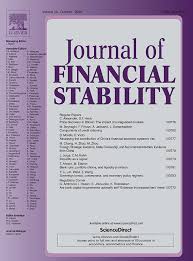
The Impact of Political Uncertainty on Institutional Ownership
in: Journal of Financial Stability, December 2021
Abstract
This paper provides original evidence from institutional investors that political uncertainty greatly affects investment behavior. Using institutional holdings of common stock, we find that institutions significantly reduce their holdings by 0.8–2.3% points during presidential election years. Such effect holds for gubernatorial elections with cross-state-border difference-in-difference analysis and for tests using a political uncertainty index. The effect is the opposite for American Depository Receipts (ADRs). In addition, we find that institutions benefit financially from the observed strategy, and such strategy is in line with predicted outcomes of presidential election polls.

Banking Globalization, Local Lending, and Labor Market Effects: Micro-level Evidence from Brazil
in: Journal of Financial Stability, October 2021
Abstract
Recent financial crises have prompted the interest in understanding how banking globalization interacts with domestic institutions in shaping foreign shocks’ transmission. This paper uses regional banking data from Brazil to show that a foreign funding shock to banks negatively affects lending by their regional branches. This effect increases in the presence of frictions in internal capital markets, which affect branches’ capacity to access funding from other regions via intra-bank linkages. These results also matter on an aggregate level, as municipality-level credit and job flows drop in exposed regions. Policies aiming to reduce the fragmented structure of regional banking markets could moderate the propagation of foreign shocks.
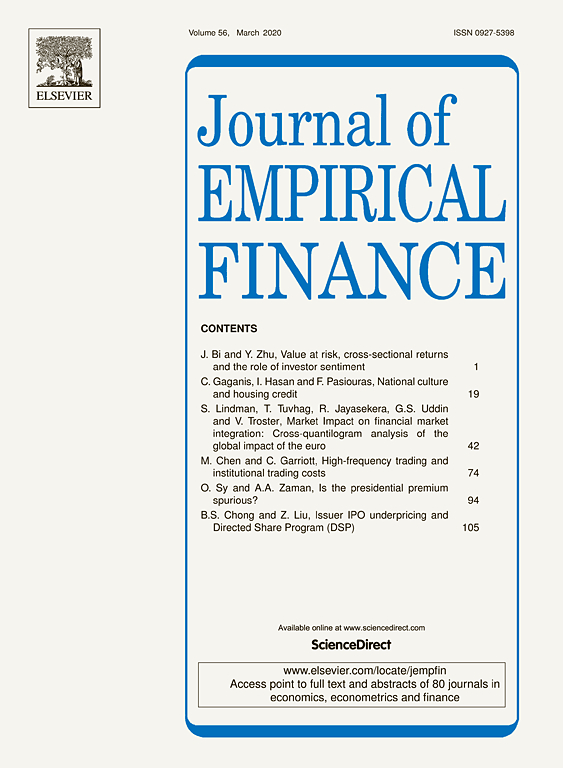
Stock Price Fragility and the Cost of Bank Loans
in: Journal of Empirical Finance, September 2021
Abstract
This study examines whether the flow volatility experienced by institutional investors affects firms’ financing costs. Using Greenwood and Thesmar’s (2011) stock price fragility measure, we find that there is a positive relationship between fragility and firms’ costs of bank loans. This effect is most pronounced when lenders rely more on institutional shareholders to discipline corporate management, or when loans are made by relationship lenders, suggesting that unstable flows could weaken institutional investors’ monitoring effectiveness and strengthen relationship banks’ bargaining power.
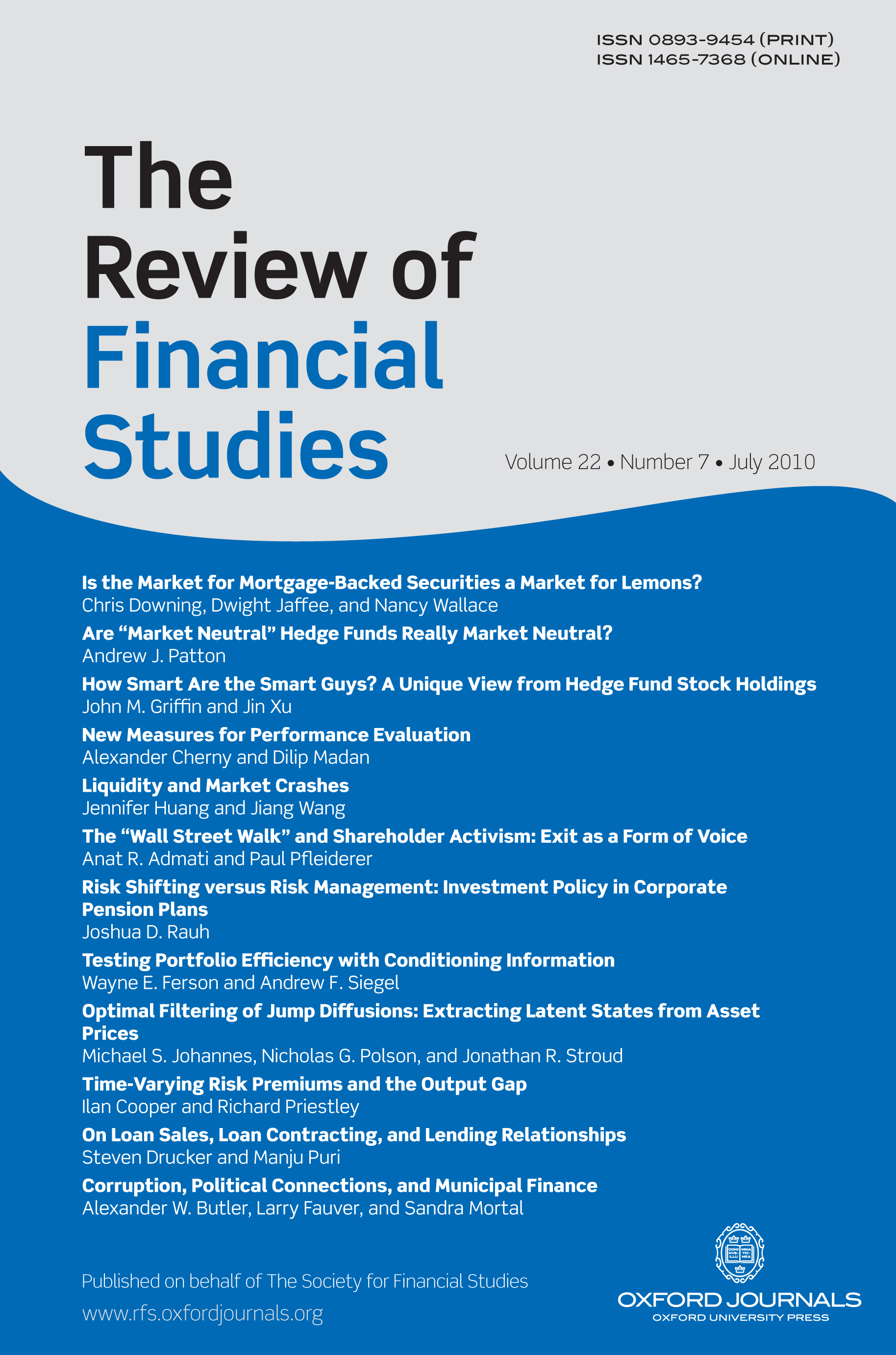
Political Cycles in Bank Lending to the Government
in: Review of Financial Studies, Nr. 6, 2021
Abstract
We study how political party turnover after German state elections affects banks’ lending to the regional government. We find that between 1992 and 2018, party turnover at the state level leads to a sharp and substantial increase in lending by local savings banks to their home-state government. This effect is accompanied by an equivalent reduction in private lending. A statistical association between political party turnover and government lending is absent for comparable cooperative banks that exhibit a similar regional organization and business model. Our results suggest that political frictions may interfere with government-owned banks’ local development objectives.
Arbeitspapiere
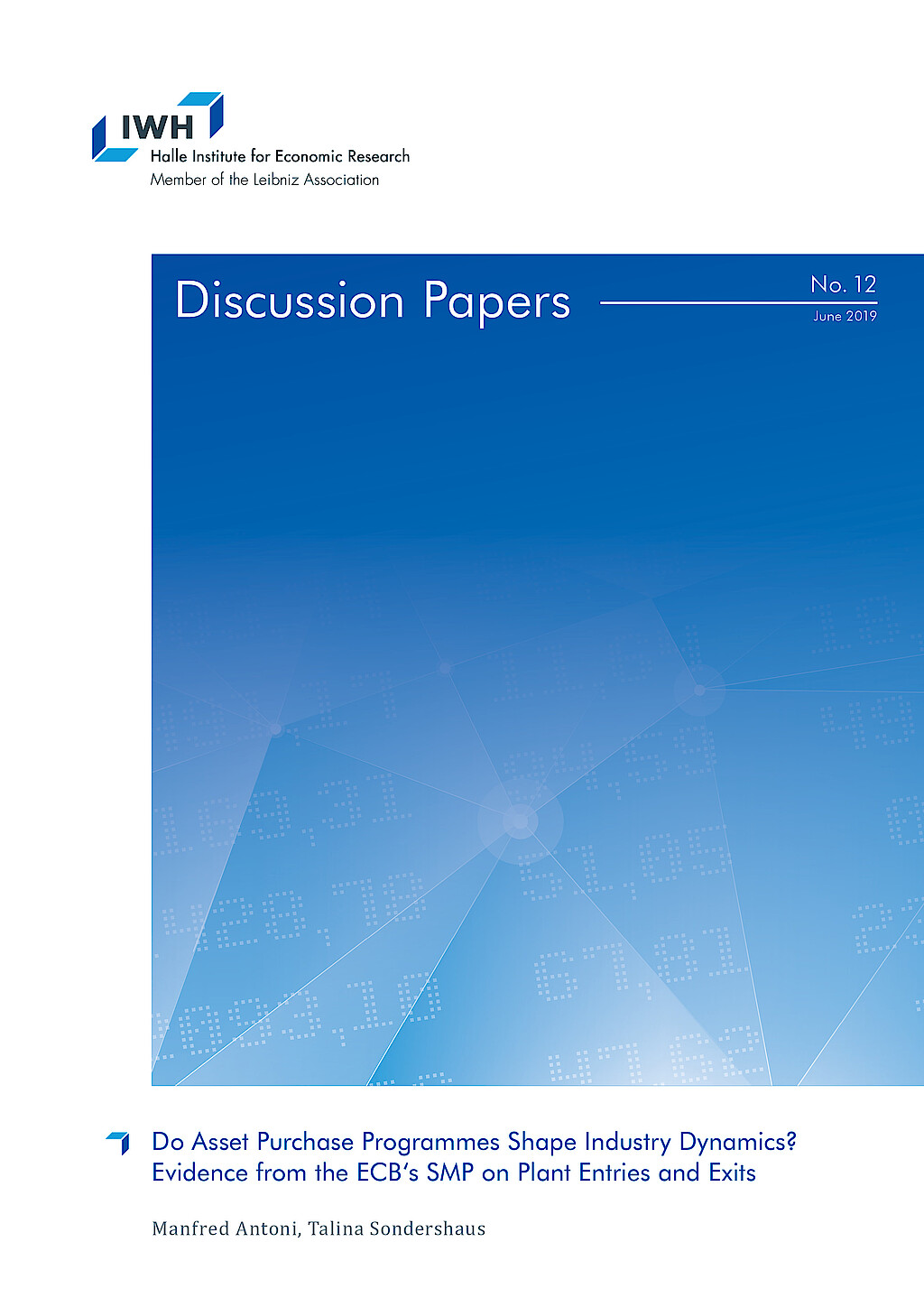
Do Asset Purchase Programmes Shape Industry Dynamics? Evidence from the ECB's SMP on Plant Entries and Exits
in: IWH Discussion Papers, Nr. 12, 2019
Abstract
Asset purchase programmes (APPs) may insulate banks from having to terminate relationships with unproductive customers. Using administrative plant and bank data, we test whether APPs impinge on industry dynamics in terms of plant entry and exit. Plants in Germany connected to banks with access to an APP are approximately 20% less likely to exit. In particular, unproductive plants connected to weak banks with APP access are less likely to close. Aggregate entry and exit rates in regional markets with high APP exposures are also lower. Thus, APPs seem to subdue Schumpeterian cleansing mechanisms, which may hamper factor reallocation and aggregate productivity growth.

‘And Forgive Us Our Debts’: Do Christian Moralities Influence Over-indebtedness of Individuals?
in: IWH Discussion Papers, Nr. 8, 2019
Abstract
This paper analyses whether Christian moralities and rules formed differently by Catholics and Protestants impact the likelihood of households to become overindebted. We find that over-indebtedness is lower in regions in which Catholics outweigh Protestants, indicating that Catholics‘ forgiveness culture and a stricter enforcement of rules by Protestants serve as explanations for our results. Our results provide evidence that religion affects the financial situations of individuals and show that even 500 years after the split between Catholics and Protestants, the differences in the mind-sets of both denominations play an important role for situations of severe financial conditions.
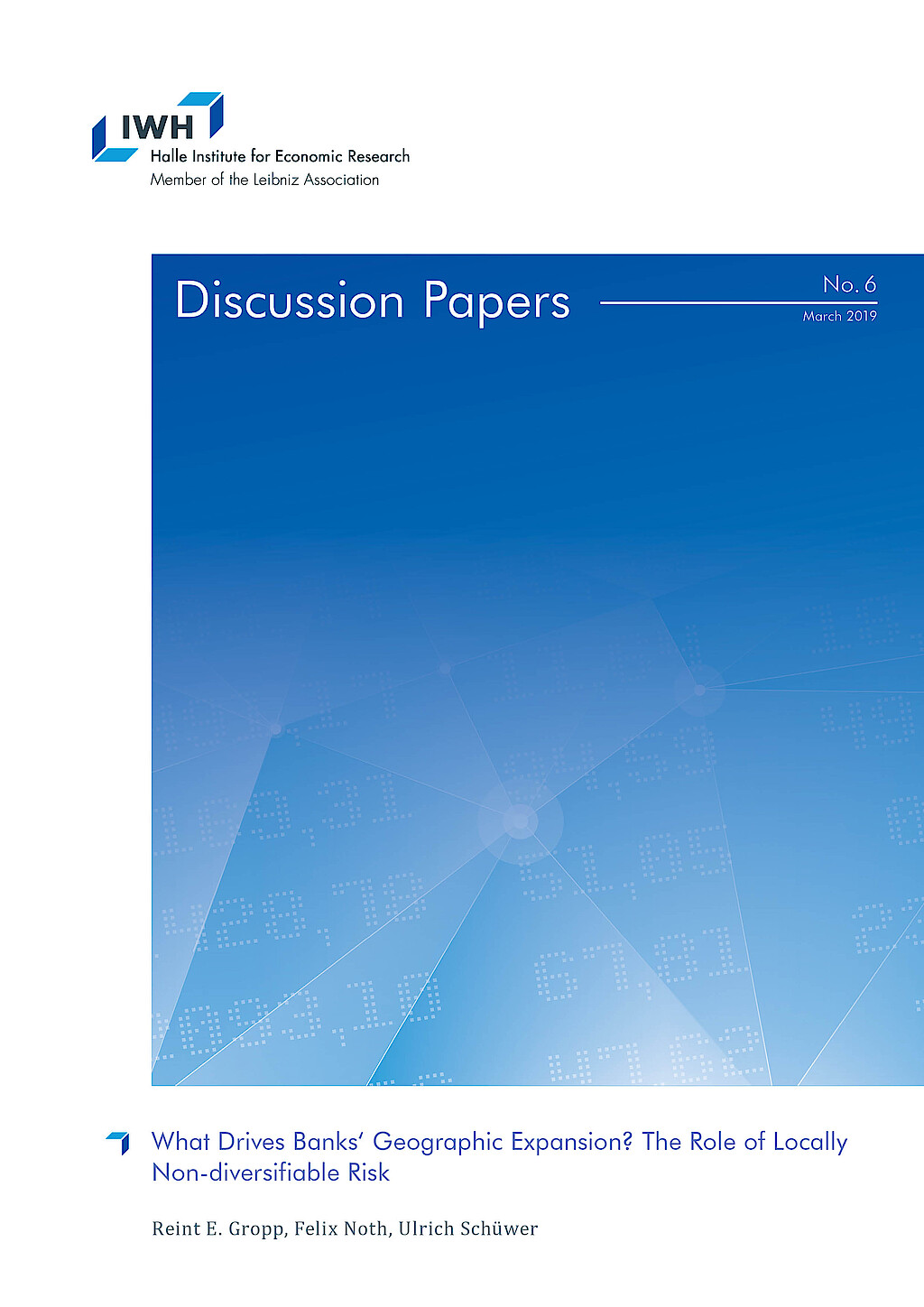
What Drives Banks‘ Geographic Expansion? The Role of Locally Non-diversifiable Risk
in: IWH Discussion Papers, Nr. 6, 2019
Abstract
We show that banks that are facing relatively high locally non-diversifiable risks in their home region expand more across states than banks that do not face such risks following branching deregulation in the 1990s and 2000s. These banks with high locally non-diversifiable risks also benefit relatively more from deregulation in terms of higher bank stability. Further, these banks expand more into counties where risks are relatively high and positively correlated with risks in their home region, suggesting that they do not only diversify but also build on their expertise in local risks when they expand into new regions.

Politics, Banks, and Sub-sovereign Debt: Unholy Trinity or Divine Coincidence?
in: Deutsche Bundesbank Discussion Paper, Nr. 53, 2018
Abstract
We exploit election-driven turnover in State and local governments in Germany to study how banks adjust their securities portfolios in response to the loss of political connections. We find that local savings banks, which are owned by their host county and supervised by local politicians, increase significantly their holdings of home-State sovereign bonds when the local government and the State government are dominated by different political parties. Banks' holdings of other securities, like federal bonds, bonds issued by other States, or stocks, are not affected by election outcomes. We argue that banks use sub-sovereign bond purchases to gain access to politically distant government authorities.
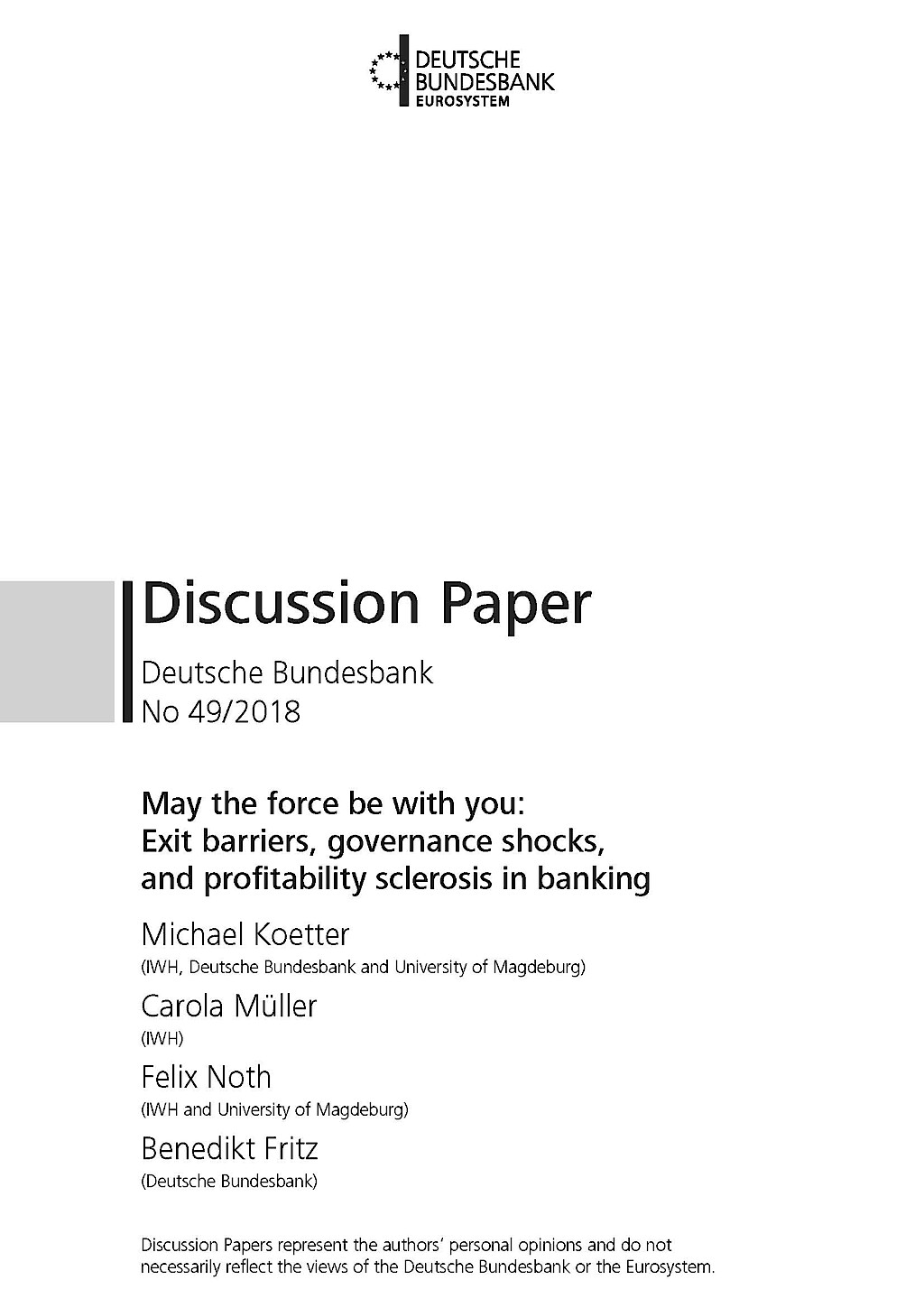
May the Force Be with You: Exit Barriers, Governance Shocks, and Profitability Sclerosis in Banking
in: Deutsche Bundesbank Discussion Paper, Nr. 49, 2018
Abstract
We test whether limited market discipline imposes exit barriers and poor profitability in banking. We exploit an exogenous shock to the governance of government-owned banks: the unification of counties. County mergers lead to enforced government-owned bank mergers. We compare forced to voluntary bank exits and show that the former cause better bank profitability and efficiency at the expense of riskier financial profiles. Regarding real effects, firms exposed to forced bank mergers borrow more at lower cost, increase investment, and exhibit higher employment. Thus, reduced exit frictions in banking seem to unleash the economic potential of both banks and firms.



















